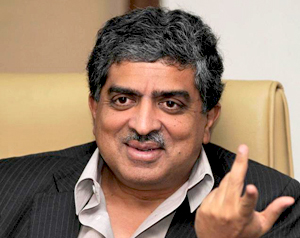 Melbourne, Oct 16: Aadhaar project is an example of using modern technology to leapfrog for future development and transformation of a country, UIDAI chairman Nandan Nilekani has said.
Melbourne, Oct 16: Aadhaar project is an example of using modern technology to leapfrog for future development and transformation of a country, UIDAI chairman Nandan Nilekani has said.
"Aadhaar project is one such example of using modern technology to leapfrog," Nilekani told a packed audience while giving an oration titled 'India's transformation: The role of Information Technology' here last night.
"Aadhaar project is to solve the problem of people who do not have an acknowledgement of their existence by people and the state or lack of acknowledgement of their identity," he said.
Nilekani, an IIT-ian who left Infosys to join the government as the head of the Unique Identification Authority of India (UIDAI), stressed that by giving every Indian person a unique 12-digit number under the Aadhaar project could change their lives, and the nation.
Nelikani said that in India which has the total population of over one billion, only 50 million people had passports which was mere five per cent of total population, around 30 million people paid taxes and over 150 million people had driver licence.
"All these traditional IDs are only available to a very narrow segment of India's population," he said, adding that the need to create an ID system which can then provide an access to other host of public services and utilities was imperative in modern times.
"Not having an identity today can be a huge impediment."
"Government has set up this Aadhaar programme principally for two main reasons. One is to give everybody an ID so that they can participate in so called modern economy and second, is to see that its numerous welfare schemes which goes to individuals are being passed to the genuine beneficiaries."
The project can be used to demonstrate that modern technology can be used for future development and transformation of a country
With Aadhaar in place, the government could deliver entitlement and subsidies in much more efficient and equitable way, he said.
"Aadhaar", or identification number, is merely a platform that can be utilised for other applications that many people are unable to access without formal identification, he said.
Since the commencement of the project 30 million bank accounts have been opened as a direct benefit of the Aadhaar card, and 10 million transactions have been made using the unique ID number.





Comments
Add new comment